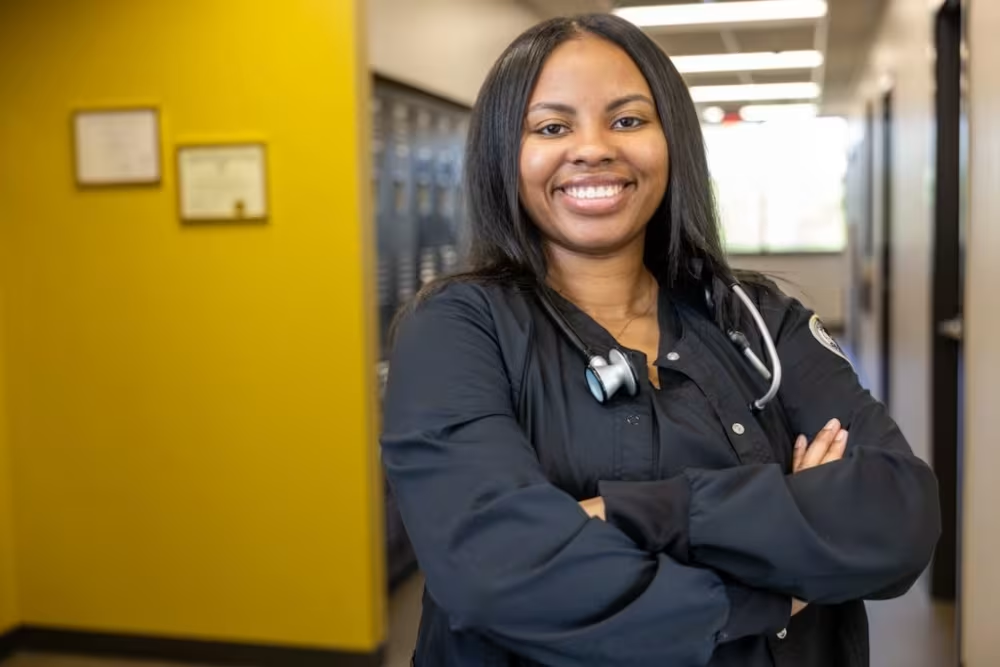Going Back to School for Nursing: Your Complete Guide
Each blog post is dated and contains accurate information as of that date. Certain information may have changed since the blog post publication date. If you would like to confirm the current accuracy of blog information, please visit our ABSN overview page or contact admissions at (877) 505-2276.
For many people, going back to school for nursing is worth it because it allows them to join a respected and in-demand field with high earning potential and advancement opportunities. To find the right program, consider the degree you’ll earn, the program format, clinical placements and NCLEX preparation.

Going back to school for nursing is a big decision, but there are many reasons why it’s worth it. Nurses are in high demand, and the career has high earning potential, diverse specializations and advancement opportunities.
Harding University’s accelerated Bachelor of Science in nursing program is designed for career changers and transfer students. It builds on your educational history, allowing you to earn a Bachelor of Science in nursing in as few as 16 months.
When returning to school, you want to choose the right program for you. Important factors to consider include the degree the program confers, program format, clinical placements and NCLEX-RN exam preparation.
Why Consider Going Back to School for Nursing?
Is going back to school for nursing worth it? While nursing school is a time and financial investment, the many benefits of a nursing career make the challenges worthwhile. Nurses are in high demand, have high earning potential and experience a meaningful line of work.
Nursing is a High-Demand Career
A national nursing shortage has increased the demand for nurses. The shortage is partly due to retirements outpacing new hires and the growing needs of an aging population. Entering the workforce now gives you job stability that you might not experience in other careers.
According to the U.S. Bureau of Labor Statistics, national RN employment is projected to grow by 6% between 2023 and 2033, while Arkansas RN employment is projected to grow by 7.5%. This equates to an average of 1,820 job openings each year in Arkansas.
Financial and Professional Rewards
Nurses play a crucial role in health care and are compensated accordingly. According to the BLS, nurses earned a national median salary of $93,600 as of May 2024.
If you decide that going back to school for nursing is right for you and you want to earn a BSN, you can potentially earn more in your first nursing role than you would with an associate degree.

Personal and Professional Fulfillment
Becoming an RN also means entering a highly respected profession. As a nurse, you will work closely with patients, treating them during difficult and stressful times. Nurses are highly regarded for their compassion, empathy and professionalism. This is why nurses have topped Gallup’s most trusted professions poll for more than 20 years.
Educational Pathways for Aspiring Nurses
You must pass the NCLEX to obtain a nursing license, but you must first earn a nursing degree. There are a few educational pathways you can take to become a nurse:
- Associate degree in nursing: An ADN can be earned through a two-year program offered by community colleges and universities.
- Bachelor of Science in nursing: A BSN can be earned through a four-year undergraduate program; however, you can earn it in less time if you qualify for an accelerated program.
While graduating from both degree programs qualifies you to take the NCLEX, there are many benefits to pursuing a BSN over an ADN.
Nurses with a BSN are in high demand because of the quality of their education. A BSN education has been shown to better prepare nurses to exercise clinical judgment in various scenarios and develop strong skills in case management, leadership, communication and health promotion. Studies have also shown a link between a bachelor’s education and improved patient outcomes.
Earning a BSN can also make you more competitive in the job market. According to the American Association of Colleges of Nursing, 69.8% of employers surveyed preferred hiring nurses with a BSN.

Read more to learn how you can prepare for nursing school.
Accelerated BSN and Second-Degree Programs
If you have a non-nursing degree or a minimum number of college credits, you can earn a BSN without enrolling in a four-year program. Accelerated BSN programs shorten the time needed to earn a BSN by leveraging your existing college experience.
Harding’s ABSN program allows students to earn a BSN in as few as 16 months. Because ABSN students have either a non-nursing bachelor’s degree or at least 64 college credits, they can start nursing courses as soon as the first semester instead of having to complete two years of general education courses first.
The ABSN program features a hybrid format that combines online coursework, nursing labs and clinical rotations to provide students with a well-rounded nursing education.
The online nursing coursework provides a foundation in nursing theory and core science concepts, preparing students for their work in nursing labs. These labs include two types: skills labs and simulation labs. In skills labs, students will practice skills such as wound care on high-tech medical manikins.
These manikins will also serve as patients during simulation labs. Students must treat these manikins during mock clinical scenarios, requiring them to exercise their clinical judgment and work as a team as they provide realistic patient care in a safe, simulated setting.
Lastly, each curriculum component prepares students for clinical rotations where they will work in local health care facilities, providing real patient care under supervision.
Choosing the Right Nursing Program
Going back to nursing school is an important decision, which is why you should carefully consider your options. When choosing a nursing program, obvious factors include location, tuition and admission requirements, but that’s not all.
As you decide to return to school and become a nurse, consider the program format, clinical placements and NCLEX preparation.

Hybrid Nursing Programs
If you are enrolling in school later in life or want to become a nurse quickly, choosing a program with a hybrid format can be a smart decision. The online coursework gives students the freedom to complete coursework when it’s most convenient. When combined with the hands-on, experiential learning gained through in-person labs and clinicals, students get the best of both worlds.
Clinical Placement Support
Clinical placements are essential to your nursing education. Clinicals are where you will learn what it’s like to work as a nurse, provide direct patient care and network with the talented health professionals in your area.
Harding University has partnered with exceptional health care providers in the Rogers, Arkansas, area including Mercy Hospital Northwest, Vantage Point Behavioral Health Hospital and Arkansas Children’s Hospital.
These partnerships allow students to explore a wide variety of nursing specialties including:
- Acute Care
- Community Health
- Mental Health
- Obstetrics
- Pediatrics
Preparing for the NCLEX
Passing the NCLEX is the last step before earning a nursing license and getting your first RN job. The exam is rigorous and requires significant preparation. While you must take the initiative to study on your own, it’s still important that your nursing program incorporates NCLEX preparation into the curriculum.
At Harding, NCLEX preparation is incorporated into the online coursework and simulation labs. The curriculum is designed to instill in students the confidence needed to take the exam. This is evident through Harding’s 100% NCLEX pass rate for first-time test-takers in 2024.
Read more to learn why Harding University has been named the best nursing school in Arkansas.

Embarking on Your Nursing Education Journey
Nursing is a high-demand career that offers many benefits, from high earning potential to working in a respected field. Returning to school and earning a nursing degree is the first step in the career transition, which is why it’s important to pick the program that best fits your needs and career goals.
Harding’s ABSN program helps students complete the first step in the career transition. The curriculum incorporates flexible online learning with hands-on labs and clinicals, giving students a comprehensive education that fits their busy lives.
Our admissions counselors strive to make going back to nursing school as simple as possible for ABSN students. Contact a counselor today to learn more about the ABSN program and how you can take the first steps in your nursing education.
